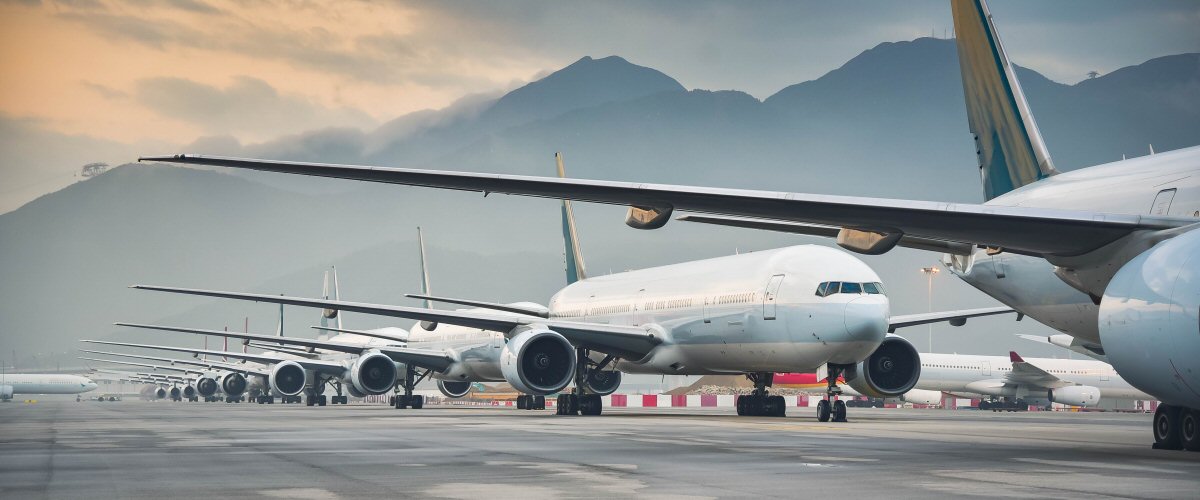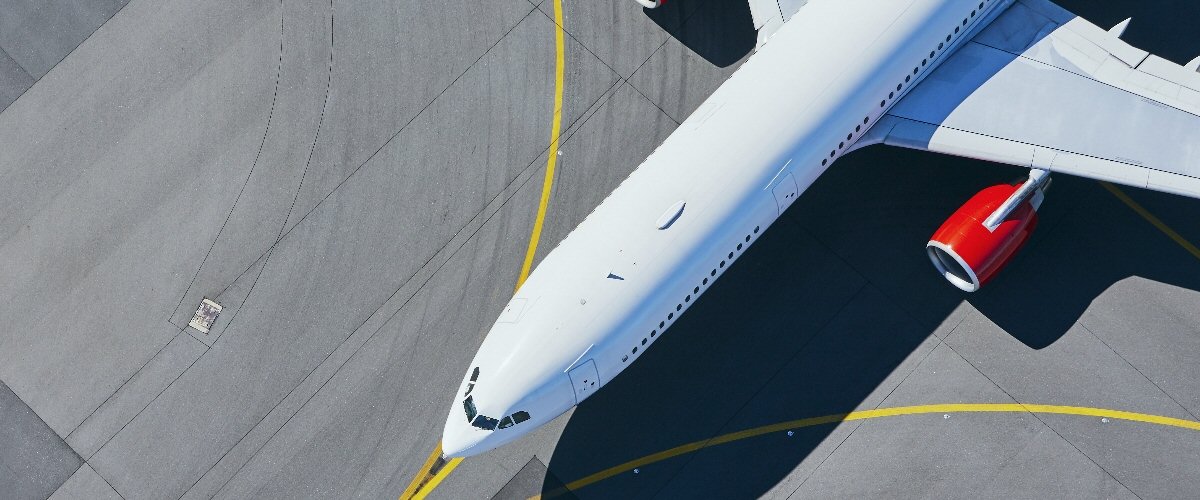Date: 03/05/2024 (Edition 8) Download PDF version
.png)
Last year many of us were intrigued to see the lease of two B777s from Turkish Airlines to IndiGo, an airline of exclusively A320 family narrowbodies (323) and ATRs (50). This did not fit their business model as we knew it. Over 90% of the airline’s flights are domestic, with the international flights principally short-distance migrant worker traffic to the Middle East. With the landmark 500 A320 order at the Paris Airshow in 2023 (their backlog is currently still up at 950), it seemed normal service resumed. However, with last week’s 30 A350 order, with an additional 70 on option, the Indian carrier appears to be leaning into the idea.
Firstly, it is no surprise the airline went for Airbus, with their current order backlog no doubt giving them favour when negotiating the deal. Another interesting detail is that with Airbus’ cockpit commonality, it is said to only take 5 days to train to fly an A350 from being an A320 pilot. This will aid the transition of pilots and help prevent shortages in what is often a tight market. Indian pilot salaries can be as low as US$30,000 a year, a tenth of some of their Middle Eastern counterparts, at the top of the spectrum.
As recently as January 2024 Airbus invested in an Indian flight school for A320 and A350 pilots. However, this was a joint venture with Air India, likely with some clause to prevent pilots from going to their competitor for some time. Moreover, this may discourage Airbus from investing further in the country to not double down on one market. Air India are of course the ones who will look at this order with greatest interest. They currently operate 62 widebodies and their 470 aircraft Paris order was arguably equally as impressive as IndiGo’s since it consisted of 70 widebodies (40 of which were A350s). Six of the A350s have already been delivered in 2023.
Recently, Tata Group announced they hope to complete the Air India Vistara merger by the end of 2024, faster than initially planned. Part of this has included the collation of the low-cost entities in the group, so they are ready to fight for IndiGo’s market share. It appears IndiGo are looking to fight back on the long-haul front!
A question still exists about whether there is a second battleground to fight on though. India is always hailed as one of the fastest growing markets so the immense narrowbody orders do somehow seem feasible, if still extreme. New short-haul markets can always be made if the pricing is right. Long-haul is a different beast, however. Markets must be more established to fill the planes and the fares are often significantly higher. Wealth disparity in the country will mean their consumer base isn’t anywhere near the scale of their current one. Further, the likes of Norwegian teach us that low-cost long-haul can be difficult, as the cabin product often becomes a higher priority to the consumer.
A brief nod goes to whether they consider making themselves a new transit hub, but the competition from the Middle East is fierce, who also have a better geographical location. As if consolidating their lead, Emirates also announced their new $35bn AL-Maktoum airport plans this week, which will consist of 5 runways. The question will therefore be if tourism and the Indian middle-class growth can match the ambition of the two Indian titans.
Two of Europe’s top three airline groups, Lufthansa Group and Air France-KLM have published their Q1 figures this week with higher net income losses than the initial forecasts and Q1 2023. Despite a 5.3% increase in revenue and a 12.1% increase in passenger numbers compared to Q1 2023, Lufthansa Group has suffered a loss of €734m, a 57% increase. AFKLM saw its revenue and passenger numbers increase by 1.5% and 5.6% respectively but noted a €480m net loss compared to the €143m loss in the previous year.
Typically, airlines experience financial losses in the first quarter due to reduced bookings during the low season. However, falling cargo rates, costly strikes, and disruptions arising from capacity constraints and flight cancellations have caused the losses to surpass any initial expectations. This was particularly visible during the initial three months of this year, with Lufthansa spending approximately €350m, primarily on increased staff wages and the financial fallout from flight cancellations. Meanwhile, Air France-KLM faced a compensation payout of €50m, predominantly to customers of its Dutch carrier, further contributing to its financial woes.
With the EBIT margins of LHG and AFKLM dropping by 2.5% and 4.3% year-on-year respectively, it now seems that the rising operating costs have caught up with the dynamic post-pandemic recovery. In response to that, the operators were quick to announce significant cost-cutting measures. Air France-KLM revealed plans to tighten spending for the remainder of the year, including a freeze on hiring support staff, to mitigate financial strains while still warning about a 2% cost increase in the second quarter. Similarly, Lufthansa is set to implement operational cost reductions by hiring staff on new contracts, pausing new projects, and intensifying scrutiny over administrative staffing to curb heavy losses incurred due to strikes. Fortunately, both carriers have confirmed the completion of their collective bargaining agreements and anticipated no further disruptions from strikes or labour negotiations for the remainder of the fiscal year.
As airlines gear up for what they say would be a busy summer season, questions linger about the sustainability of this recovery trajectory. Rising repair and maintenance costs, coupled with ongoing capacity constraints, will likely force airlines to keep fares elevated. The question is whether demand will still support them.
European Union regulators have opened an investigation into 20 airlines for potentially “misleading greenwashing practices”. The claims are largely based on the benefits of offsetting emissions from flying; including creating incorrect impressions that paying an additional fee to finance climate projects can reduce CO2, and supporting the use of alternative aviation fuels can fully counterbalance the CO₂ emissions.
Furthermore, regulators noted that the airlines had made claims about plans to reach net zero emissions “without clear and verifiable commitments, targets, and an independent monitoring system.” The national regulators involved are Belgian, Dutch, Norwegian and Spanish.
As we reported last month on KLM's misleading advertisements and the airline credibility report here, IBA is beginning to see a trend in greenwashing crackdowns. It signifies a rising tide of credibility issues within the industry, and we expect more airlines to be called out soon. However, this does not take away the fact that there are airlines sincere about their sustainability efforts and therefore should be given credit when they do.
Want more aviation ESG news?
Our regular update looks at the key trends and market indicators using data and analytics provided by IBA Insight.




IBAのワンストップ航空インテリジェンスプラットフォームであるIBA Insightを紹介します。IBAの広範なフリート、価値、市場データと飛行データ、専門家の意見とを組み合わせ、投資、リスクプロファイリング、航空機ポートフォリオの監視に大きな自信と保証を提供します。

受賞歴のあるISTAT認定鑑定士の大規模なチームと 30年以上にわたる独自のデータを活用しているIBAは、価値評価市場のリーダーです。グローバルに活動し、航空機、エンジン、ヘリコプター、貨物機、航空貨物、発着枠、スペアなど、さまざまな資産の価値について、独立した公平な意見とアドバイスを提供しています。お客様の期待を超えるように常に努力しており、IBAの客観的な判断は、融資、資産の回収、商業開発、転売に必要な保証をサポートします。

IBAは、世界中の大手航空機・エンジンリース会社と協力しています。当社の業界知識の深さは、専門家としてのアドバイスにも反映されているので、投資サイクルを通じてお客様をサポートし、お客様の旅のあらゆる段階で自信を与えています。評価、フリートの選定、ポートフォリオ開発からリース終了時の引渡、転売まで、リース期間中のあらゆるリスク評価と資産管理活動において、お客様をサポートします。

航空投資は複雑な問題を抱えていることがあり、多額の金銭的な利害関係が絡んでいるため、運に任せることはできません。初めて投資をされる方でも、市場で実績のある方でも、IBAは資産クラスの複雑さを切り開き、投資機会をよりよく理解するためのお手伝いをいたします。お客様と協力し、ポートフォリオの開発、多様化をサポートし、戦略的なニーズを充足いたします。

IBAは30年以上にわたり、世界的な航空会社や地域の航空会社と協力して、評価やアドバイザリーサービス、航空データインテリジェンス、航空機やエンジンの引渡におけるサポートを提供してきました。世界中の様々な航空プロジェクトに協力して取り組み、クライアントのさらなるリソースの要件を満たし、必要な時にはいつでもどこでもプロジェクト管理のサポートを提供しています。

当社は、訴訟支援と紛争解決に臨機応変なアプローチをとり、クライアントの法的戦略に合わせた思慮深い解決策を見出しています。30年以上にわたる独自の航空データへのアクセス、戦略的M&Aへの定期的な関与、および航空機管理の専門知識により、当事者間の典型的な争点となっている分野に定期的にアクセスできます。IBAは、航空機の損傷や損失に対する保険関連の和解から、貸手と借手の間の紛争、多くの場合、引渡時の紛争に至るまで、様々な側面からクライアントを直接、または法務チームを通じて支援します。